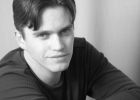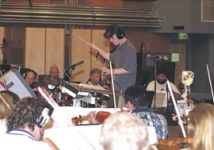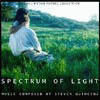|
Versión en español
 Steven
Gutheinz is a composer of the new wave that tries to find a place
in Hollywood. With a broad experience in the field of the short films,
he has done already some feature films and he has been compared with Thomas
Newman among others. Let's see what can Steve explain us about
his work. More in www.stevengutheinz.com. Steven
Gutheinz is a composer of the new wave that tries to find a place
in Hollywood. With a broad experience in the field of the short films,
he has done already some feature films and he has been compared with Thomas
Newman among others. Let's see what can Steve explain us about
his work. More in www.stevengutheinz.com.
BS: You studied with big names such as Raksin, Bernstein or Christopher Young. How was the experience of be learning from the masters? Do you remember something specially interesting or funny about the lessons?
SG: It was a great experience, no doubt. Raksin and Bernstein were both great
and they both gave plenty of anecdotes about the business. Raksin also
autographed a copy of "Laura" for my grandmother, which was very
nice!
Chris Young is very much in touch with what it is like to be a young up
and coming film composer in Hollywood these days and is a huge inspiration
to many composers like myself. Not only is he a great film composer, but
he cares about film music as an art form. He's passionate about it, and I
think it really shows.
BS: How does a composer like you decide that he wants to direct his career
towards the music for movies? Do you have your "heroes" of the film music,
whose works have inspired you to follow this way? Talk us a bit about how
everything began, and your musical education in that sense...
SG: I grew up with the scores to "Star Wars", "E.T.", and all of the classic
scores that John Williams (and others) did during that time. I think those
scores were probably the first pieces of symphonic music I really listened
to! So, I was into film music long before I started getting into classical
music and composition. It has been with me since the beginning.
BS: When it comes to student films, you have a pretty large curriculum.
SG: I might guess that not all of the directors were your friends before start
their projects. How does it works with student films, are the directors
looking for you or you are looking for the directors? As there are no
managers involved, how do you get in contact with each other?
I would say that well over half of the student films I've scored have come
from existing relationships and contacts. The others came about through
various channels, but student directors are always looking for composers.
If the film is a student film, they're most likely working with a composer
for the first time, so they have to actually go out and find someone to
score their film.
BS:  Surely
the budget is always a problem when it comes to student films. You seem to
like more to use smaller ensembles instead of fake the orchestra through a
sampler. Do you use software just when the final sound is going to be sampled,
or you compose always with it, even if later the performance comes with real
instruments? Surely
the budget is always a problem when it comes to student films. You seem to
like more to use smaller ensembles instead of fake the orchestra through a
sampler. Do you use software just when the final sound is going to be sampled,
or you compose always with it, even if later the performance comes with real
instruments?
SG: Budgets are always a problem, but I do like to work with live musicians when
I can. Sometimes I can't get the money to do it, but I always try.
I use software throughout the scoring process. Even in live scores,
everything is recorded directly into Pro Tools! I use Digital Performer,
Pro Tools, Gigastudio, and Finale.
BS: Since you have worked with both orchestras and small ensembles, do you use
to have problems when looking for performers, or it's just a simple matter
of budget?
SG: It's a matter of budget. It's obviously very expensive to record a film
score with full orchestra, so expensive that only the bigger budget films
have that luxury. I must say, though, that I really enjoy doing small
chamber scores. People tend to believe that the more musicians, the better.
That isn't always true. However, you can't use a chamber group to score
Star Wars!!
BS: "The Crossing" is scored for full orchestra and doesn't belong to any
film. What were your motives for writing? Was it comissioned with some
reason or was just your decission? Without any budget belonging to a movie
or a comission, did you just went and hired the orchestra by yourself?
SG: "The Crossing" is part of a much larger work that I hope to do someday. If
not for a film score, then for a concert work or opera.
BS: Tell us a bit about your work with Rob Hardy. You made your first feature film with him: "Trois" and later, "Pandora's box". How do you think that you
contribute with your music to his films?
SG: I came onto "Trois" very late in the game and was hired to replace part of
an existing score. It was far from an ideal situation. I had about 2 weeks
to compose, record, and deliver my cues and I had a very small budget!
Luckily, Rob was a great guy to work with.
"Pandora's Box" was also very low budget and I had very little time to work
on it. Again, though, Rob was great to work with.
BS: Who is the most interesting director that you found among the ones you
have worked with? Someone who you think that would be a star if he only had
the chance of have his work widely exposed...
SG: Tough question! I've worked with a lot of talented filmmakers, I could
never name one. There are several who I believe will go on to do great
things.
BS:  "Spectrum
of light" seems to be one of your most popular soundtracks among many
reviewers on Internet. I haven't seen the film, but to my taste the music
gives the feeling of something that would fit good with the images, but with
a listening a bit difficult on CD. I know that your goal was to write music
for the film, so what is your opinion about the CD editions? should a soundtrack
be appreciated also in the separated listening or the only goal is to serve
the film? "Spectrum
of light" seems to be one of your most popular soundtracks among many
reviewers on Internet. I haven't seen the film, but to my taste the music
gives the feeling of something that would fit good with the images, but with
a listening a bit difficult on CD. I know that your goal was to write music
for the film, so what is your opinion about the CD editions? should a soundtrack
be appreciated also in the separated listening or the only goal is to serve
the film?
SG: I think the primary goal for any score is to support the film. Of course it
is great if the music has a life outside the film, but it isn't the primary
function of a score.
I've had a lot of people request a CD of that score, people who have never
seen the film. No one has seen the film really, it had only one screening!
BS:  "Making
Love" has a brilliant soundtrack. The music fits well on the film and
the listening in the CD is also good. Can you talk us about the experience
of that work? "Making
Love" has a brilliant soundtrack. The music fits well on the film and
the listening in the CD is also good. Can you talk us about the experience
of that work?
SG: Thanks. Overall, it was a great experience. The recording session was
quite an adventure, though. I originally had a small chamber orchestra
assembled and when we started recording the music I really didn't like the
way it was going. So after about 15 minutes of that I decided to just use 1
violin, 1 cello, piano, and dismiss everyone else. It was stressful for a
few minutes, but when we started recording again, things went smoothly. The
director and I were both pleased with the final recording.
BS: "Of light and darkness" is an unusual project. How do you approach a
videogame compared with your way to approach a film? How did you get the
job? did you contacted the makers or they contacted you?
SG: I got the job through a feature film that I had scored right before it. The
feature ("Taxed") was never even screened, but it got me the job scoring "Of
Light and Darkness". It was a very unusual game that never really got the
audience it probably deserved. The graphics were amazing (by Gil Bruvel).
In fact the game was built around his art.
The approach was nothing like a film. My job was to create background music
that functioned as part of the environment for each game level. I didn't
ever score to video or anything specific like that.
BS: Would you score more videogames in the future?
SG: Absolutely. I'm actually scoring a game demo for a developer right now. I
just haven't had the opportunity to do another game score, but I'd certainly
love to.
BS: What is the way that a composer must go through if he wants to score
feature films? Must he has a lot of contacts or is just a matter of insist
and insist ringing the producers? how does it works?
SG: It is very difficult. I wish I could tell you that there is a science to
it, but there really isn't. I think the one key to success in anything is
perseverance. Good contacts don't hurt.
BS: Through the listening of your works, one gets the feeling that you don't
have problems using all kinds of ensembles, from orchestra to small group,
sax ensemble, synthetizers... having a broad experience with many different
kinds of music, what is the most peculiar or strange work that you have
done?
SG: The most strange? I suppose that would have to be my mock jingle/TV show
theme "Goosebumps Zombies". I think it would make a great kids TV show
theme, but I haven't had much luck with that. Someday, I hope to do a theme
for TV show!!
BS: And the one you are proudest of?
SG: That is tough. I suppose I'm proudest of "Cracking Shadows". I've done so
many short films and this is one of the few where the music feels complete
to me. I can't imagine expanding the Cracking Shadows music into something
larger. Most of my other short film scores feel incomplete to me.
BS: L.A. Twister is your newest work, the film is ready to be released in USA in February. What can you tell us about it?
SG: It's an independent film directed by Sven Pape. I've known Sven for a while
now and worked with him on a small documentary he directed at Earthship.tv a
couple of years ago. "L.A. Twister" is his first feature. It's a comedy
and was a challenge for me, but I had fun.
BS: Do you have some project for the future?
SG: I have a lot of stuff lined up for next year and a few potential big breaks
in the pipeline. I can't talk about any of them here, but I'm hoping to
finally move up the ladder a little bit next year.
BS: Is it possible to make a living from composing when you are not a steady
guy in Hollywood? If not, what do you do for a living?
SG: It's hard.
BS: Internet might be good to promote oneself, but do you think that is THAT
GOOD to distribute your music? The legal mp3 sites seem to be having serious
problems to survive today...
SG: I don't know. It's been great for me, but I give away my mp3's. I'm not
sure about the pay sites (like itunes), but it seems like people are ok with
it. I personally prefer buying real CD's.
BS: After the dawn of mp3.com, where can we get your cds? in your webpage you are offering just a promo...
SG: Right now, I'm just selling the promo CD. I also sell specific things to
people who ask for them, but that's about it for now. I haven't had the
opportunity to score a big budget film yet. When I do, there will hopefully
be a real soundtrack CD for it.
BS: Nowadays, can you mention some interesting composers in the film industry?
SG: There are so many composers that I know and admire. I could never name
names! John Williams is a living master, probably the best ever. Of the
old generation, Herrmann is my favorite by far.
BS: What is your dream project? A western? A pirates movie?...
SG: Right now, my dream movie is one that has enough money to record the whole
thing without massive restrictions. I just want that opportunity!
BS: Tell me a director you would love to work with.
SG: I'd like to work with any director who likes my music.
BS: Must a film composer love the cinema or to compose for movies is just a
work?
SG: I think you have to love it. Otherwise you'll just want to quit. It's not
a good 'job' because it is so intense and so politically difficult.
BS: If you love cinema, can you recommend to all of us in BSO Spirit some great movie that might have gone unnoticed?
SG: Well, I think "Meet Joe Black" is a great movie that really didn't get much
attention (other than negative reviews). I really like the score, too.
Interview and translation by Rubén Sánchez
|





